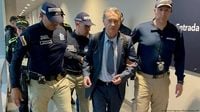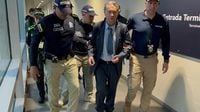Carlos Lehder, a notorious figure in Colombia's drug trade and co-founder of the Medellín Cartel, was arrested on Friday, March 28, 2025, at El Dorado International Airport in Bogotá. This marks a significant moment in the ongoing saga of one of the most infamous drug lords in history, who has been out of the country for 38 years.
The 75-year-old Lehder arrived in Bogotá on a commercial flight from Frankfurt, Germany, where he had resided since 2020. Upon his arrival, he was taken into custody by Colombian police due to an outstanding arrest warrant. "Migration Colombia placed Carlos Enrique Lehder Rivas at the disposal of the Colombian Police. Lehder Rivas, who arrived from Frankfurt, had a valid arrest warrant in our information systems," the agency stated on social media.
Lehder's capture comes after a long and complicated history with the law. He was initially arrested in Colombia in February 1987 and subsequently extradited to the United States, where he was sentenced to 135 years in prison. However, due to his cooperation with authorities, he served only 33 years before being released in 2020. Upon his release, he chose to be deported to Germany instead of returning to Colombia.
The Colombian police have not disclosed the specific charges associated with the arrest warrant that led to Lehder's detention. General Carlos Fernando Triana, the director of the Colombian Police, confirmed that they were verifying Lehder's judicial status in Colombia. "We are currently transferring the former head of the Medellín Cartel to a police unit in Bogotá to verify his judicial situation in Colombia," Triana stated.
Lehder's criminal career began in the 1970s when he was involved in a network for buying and selling stolen cars in the United States. His foray into narcotics began in 1975, leading him to form a partnership with Pablo Escobar, which would establish the Medellín Cartel as a dominant force in the drug trade. Lehder was instrumental in organizing the transport of cocaine to Miami, using Cayo Norman, a small island in the Bahamas, as a base for his operations.
In 1978, at the height of his power, Lehder made a controversial offer to then-President Alfonso López Michelsen, proposing to pay off Colombia's external debt in exchange for unrestricted drug trafficking rights. This audacious proposal was a testament to his influence and resources at the time. However, his empire began to crumble when he was arrested in 1987, leading to his extradition to the U.S.
Lehder's life has been marked by excess and eccentricity. He amassed significant wealth, which allowed him to infiltrate law enforcement and acquire lavish estates across Colombia. One of his properties, known as 'La Posada Alemana,' featured a statue of John Lennon, his idol, depicted naked with a guitar and a German World War II helmet.
After serving his sentence in a high-security prison, where he was kept five floors below ground level, Lehder became the first major Colombian drug lord to be extradited to the U.S. His cooperation with U.S. authorities, including testifying against the former Panamanian dictator Manuel Antonio Noriega, earned him a reduced sentence.
Upon his release, Lehder expressed a desire to return to Colombia, stating in a letter to former President Juan Manuel Santos that he wished to die in his homeland. His recent trip back to Colombia seemed to signal a step towards fulfilling that wish, but it has instead resulted in his arrest.
In early March, Lehder had sent a petition to the Colombian Prosecutor's Office requesting information about his legal standing in the country. The response indicated that there were no records of his involvement in criminal proceedings, which seemed to clear the way for his return. However, it appears that there were underlying issues, as he now faces a potential 24-year sentence for arms trafficking.
Lehder's capture has reignited interest in his life and the historical context of the Medellín Cartel. He is often described as being intellectually above average compared to his peers in the drug trade, speaking three languages and justifying his illegal activities through a political lens. He viewed himself as a nationalist and anti-imperialist, often critiquing U.S. drug policies.
In an interview, Lehder reflected on the consequences of his actions, stating, "My experience shows that the worst consequences of drug trafficking and the sale of expensive cocaine are the propensity for armed and lethal violence. The consumption of cocaine, especially bazuco, can quickly destroy a person's mind and heart." His words serve as a poignant reminder of the destructive impact of the drug trade.
As Lehder begins this new chapter in his life, the Colombian legal system will determine his fate. Whether he will face significant time behind bars again remains to be seen, but his story continues to unfold, reflecting the complexities of Colombia's ongoing battle with narcotrafficking.








